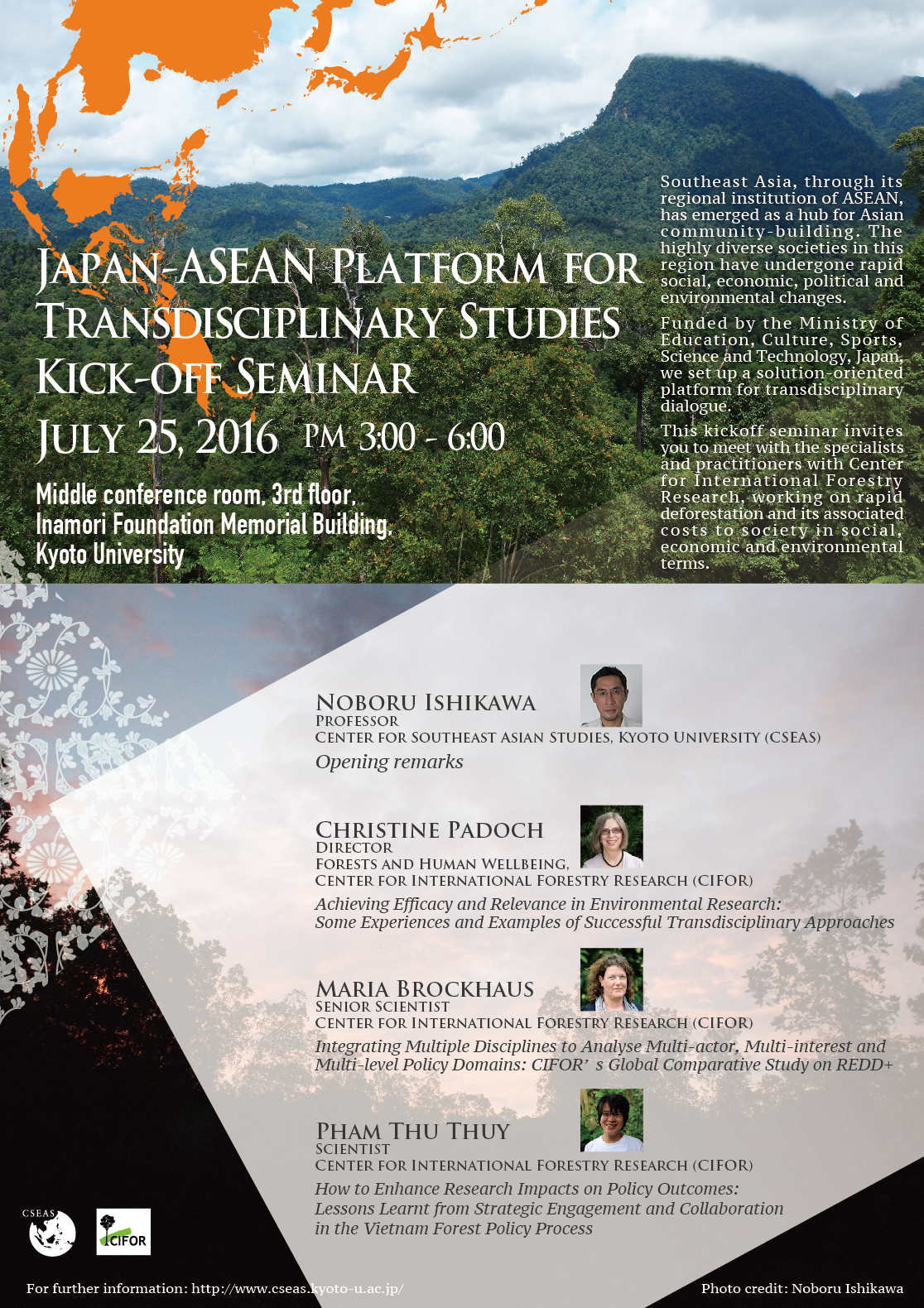日時: 2016年7月25日(月) 15:00-18:00
場所: 京都大学東南アジア研究所 稲盛財団記念館 3階 中会議室
プログラム(仮):
15:00-15:15 Opening remarks
Noboru Ishikawa Professor Center for Southeast Asian Studeis, Kyoto University
15:15-16:00
Christine Padoch Director, Forests and Human Wellbeing, Center for International Forestry Research (CIFOR)
“Achieving Efficacy and Relevance in Environmental Research:
Some Experiences and Examples of Successful Transdisciplinary Approaches”
Understanding the complex, changing and urgent issues that link human behavior and well-being with environmental sustainability, typically demands research that transcends conventional disciplinary practices. The additional imperative to translate those research efforts and results into effective and positive change requires a command of tools and skills that academic training not only rarely considers but also typically rejects. Transdisciplinary and policy-relevant approaches have proved notoriously difficult to actually carry out within research institutions and in funding and publishing environments that favor disciplinary limits. This presentation discusses experiences with several projects to explore some structures and processes that have proved useful in overcoming problems of divergent traditions of data collection and other tools, perspectives, assumptions and concepts.
16:15-17:00
Maria Brockhaus Senior Scientist, Center for International Forestry Research (CIFOR)
“Integrating Multiple Disciplines to Analyse Multi-actor, Multi-interest and Multi-level Policy Domains: CIFOR’s Global Comparative Study on REDD+”
This talk will first introduce into the research design of a global comparative study on REDD+ (GCS), a long-term research effort in 15 countries CIFOR started in 2009. REDD+ is a mechanism introduced under the UN climate change framework with the objective to reduce emissions from avoided deforestation and forest degradation in the tropics. The presentation will highlight how different disciplines collaborate and contribute to a holistic understanding of REDD+, and discuss the challenges and share experiences and lessons for designing and coordinating such a multi-disciplinary and multi country effort. The second part of the talk will then shift the focus from the research design and the researchers involved to the actual policy problem, and presents social and policy network analysis as a method to study complex environmental policy problems such a deforestation and forest degradation. REDD+ has evolved and is constantly changing in highly dynamic international, national and subnational policy arenas. With the introduction of the REDD+ idea in forest‐rich countries, new actors spanning different organizational types have entered the policy arena and put forward their understandings of what REDD+ is or should be (e.g. business actors focusing on carbon and ‘green’ investments, multinationals expressing interest in ‘green’ supply chains, state agencies for ecosystem service provision and licensing, state environmental regulatory organizations, environmental NGOs and other civil society organisations working among others on questions such as tenure, rights and benefit sharing). Network analysis can then be a useful lens to characterize single organizations that are part of the policy domain, while at the same time providing a complete overview of network structures, which enables us to understand resource flows (including information) and power relations within. The talk will provide some insights in theory and method and how it was applied in the GCS, and will end with a discussion of the methodological challenges encountered throughout the research process and the lessons that have been learned.
17:15-18:00
Pham Thu Thuy Scientist, Center for International Forestry Research (CIFOR)
“How to Enhance Research Impacts on Policy Outcomes: Lessons Learnt from Strategic Engagement and Collaboration in the Vietnam Forest Policy Process”
This presentation aims to provide lessons learnt in applying CIFOR’s research methodologies and findings to inform REDD+ and PFES policy design in Vietnam. The presentation will explain how we have strategically used two research methodologies – policy network analysis and media discourse analysis – in an informed engagement process:
(i) WHO? Identifying strategic and influential actors in, and those who are excluded from, the decision making process as collaborators that could be involved in and needs to be informed by research.
(ii) HOW? Understanding power dynamics, discourses, interests, information and resources exchange, collaboration and latent conflicts amongst these actors to inform adaptive/flexible engagement strategies during and after research.
(iii) WHEN and WHERE? Identifying strategic policy events. This will help us to prioritize where and when our research should be shared and presented to a set of strategic actors of each event.
(iv) WHAT? Identifying the current knowledge gaps and future research priorities.
The presentation will share insights on how we have built linkages between research and policy-making in Vietnam, as establishing and maintaining effective collaboration with policy actors is critical for a country-based office if we are to have continued relevance over the longer term.
関連


